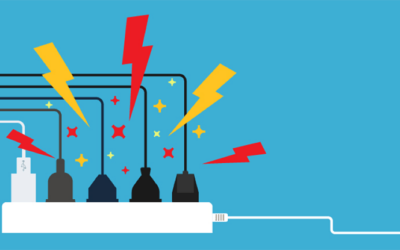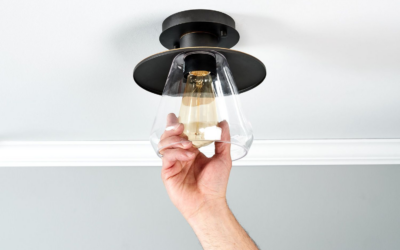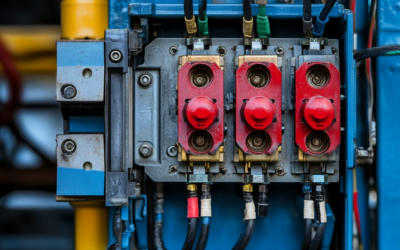Welcome to the next part of our exploration into electrical panels. In our previous article, we covered the fundamental concepts of what an electrical panel is and how it works. Building on this foundation, we are moving on to other topics useful for all homeowners. Every homeowner needs to know how to maintain and troubleshoot an electrical panel. Also, they need to know when upgrading an electrical panel is necessary and the associated costs. So, let’s proceed to uncover these essential insights.
If you have not read Part 1 yet you can find it here.
Where Can You Find Your Home’s Electrical Panel?
Imagine needing to do something with your electrical panel, like reset a tripped breaker. The initial step is knowing the panel’s location in your home. The electrical panel is typically in an out of the way place like the basement, storage room, laundry area, or garage. In older homes, it might even be outdoors. In apartments, the panel might be located inside near the entrance or tucked away behind a bedroom door.
Electrical Panel Installation
Installing an electrical panel is a task that should be carried out by a licensed electrician. During this process, electricians must adhere to a set of important guidelines such as:
- Ensuring easy access for all adults to reach circuit breakers.
- Avoiding the use of locks on panel doors or rooms containing them.
- Avoiding installation in places like bathrooms, bedrooms, exterior walls, closets, above stairs, pantries, or cubbies.
- Maintaining a clear and non-flammable area around the panel.
- Adhering to local regulations for compliance.
- Allowing a 3 foot clearance in front of the panel.
- Providing a minimum of 30 inches of space on both sides of the electrical box.
- Maintaining a working space height of 6 feet 5 inches.
- Placing the electrical box at a height of at least 4 feet off the ground, typically placing it between 5 and 6 feet.
- Ensuring the panel door opens at a 90-degree angle for easy access.
- Positioning the electrical meter near the panel.
- Having emergency lighting available for power outages.
- If installing an outdoor panel, making sure it is weatherproof to withstand corrosion, water, snow, and wind.
Electrical panel installations and any other electrical work require the right equipment for a safe and successful job. While we recommend trusting licensed electricians for these tasks, having the proper tools on hand enables you to tackle smaller electrical projects around the house confidently.
Find a wide selection of electrical tools for various needs at Rack-A-Tiers
Electrical Panel Maintenance
The average lifespan of an electric panel is typically between 25 and 40 years. However, you must regularly check your electrical panel to make sure it is functioning properly. Here are some simple maintenance tips for your home’s electrical panel:
- Occasionally inspect your electric panel for any unusual burning smells. If you notice a smell, it is most likely a sign of a problem, and you should consider getting the panel replaced.
- If you observe signs of rust or water leakage on your electrical panel, replace it immediately and correct any water-related issues.
- Typically, electric panels operate silently. If you notice unusually loud noises coming from your panel, ask an electrician to check it.
- Before installing large appliances or making significant electrical additions, make sure your electrical panel has sufficient capacity. If it does not, upgrade to a panel with a higher capacity to avoid overloading.
- Some electrical panels use fuses, while others have circuit breakers for safety. Maintaining fuse-based panels is more complicated, as the correct fuse size must be used when replacing a blown fuse. In contrast, circuit breaker panels do not require replacements when tripped. For easier maintenance, we suggest replacing fuse-based panels with circuit breaker panels.
- If you have an outdoor electrical panel, keep it clear of snow and debris.
Electrical Panel Problems
Dealing with issues in your home’s electrical panel can be a common occurrence. Tripped breakers, flickering lamps, unusually high bills, and warm walls around your home’s electrical panel are signs there is something wrong with the panel. Always be aware of potential electrical panel problems. Now, let’s discuss a few of the frequent problems homeowners might encounter.
1. Tripped Breakers
One of the most common issues with residential electrical panels is a tripped circuit breaker. As mentioned earlier, a circuit breaker trips when the electrical circuit becomes overloaded.
Imagine using your hair dryer while the television and desktop computer are all running. Even though they are plugged into different outlets, they might be on the same circuit. This can lead to excessive power usage, causing the breaker to trip. If you experience a tripped breaker, turn off the devices responsible for tripping the breaker, then open your electrical panel box and identify the tripped breaker.
Among the many switches on the panel, there will be one stuck between the on and off positions, while the rest remain on. This switch is the tripped breaker. Move the switch to the off position and then back to the on. Now your electrical devices should work as usual.
If you have turned off the problematic device and the breaker keeps tripping, there might be another issue, and it is recommended to call an electrician for assistance.
2. Insufficient Capacity
If your circuit breaker trips often, it could be due to your electrical system’s capacity being exceeded.
In the case where only one breaker is causing an issue, you can fix it by relocating some electrical devices from that circuit to a different one. If you find there are not enough circuits available, you will need an electrician to reconfigure your breakers or add more circuits.
However, there is also a possibility that you have simply reached the maximum capacity of your home’s electrical panel. If you notice breakers frequently tripping or if your electrical panel and the surrounding walls feel warm to touch, it could be an indication that you need to upgrade your entire electrical panel to a higher amp service. While this can be a substantial and costly undertaking, it is sometimes necessary.
3. Rust and Corrosion
We all know moisture and electricity do not go well together. Moisture and humidity can cause rust and corrosion. When you notice corrosion on an electrical panel or the surrounding wiring, it indicates the presence of moisture.
However, if you only see corrosion or rust on the metal door or frame of the panel, it might not be a major issue. In this case, sanding down the panel, applying primer, and repainting can usually resolve the problem.
But, if you observe corrosion on the breaker switches or electrical wiring, it is a more serious concern. This means moisture is infiltrating your electrical system. If you come across corroded wires or switches, contact an electrician for assistance.
4. Short Circuit
When a “hot” wire contacts other wires, a short circuit happens. If you reset a tripped breaker and it immediately trips again, a short circuit is likely the reason. Short circuits can occur for various reasons such as, animals damaging wires or using a device with a faulty circuit.
If you suspect a specific device is causing the short, turn off the breaker controlling the outlet. Inspect the power cord for melted areas or damage. Examine the outlet for signs of burning or dark marks, along with any burnt smells. These indicate a flawed circuit.
If unplugging the device allows the breaker to reset normally, that device probably caused the short. If not, call an electrician to help find the short circuits.
5. Ground Fault
Much like a short circuit, a ground fault occurs when a hot wire makes contact with a ground wire or something else that is connected to the ground. When something is “grounded,” it means that electricity can flow from it to the ground. Ground faults are often found near water, such as in a bathroom, kitchen, or laundry room where outlets might have a ground fault circuit interrupter (GFCI).
GFCIs are special devices integrated into electrical outlets or breakers. They immediately shut off power if they detect a ground fault. If a ground fault happens, you must unplug the device that caused the issue and then reset the GFCI outlet or breaker.
6. Power Surge
In your home, a power surge occurs when there is an increase in electrical voltage going through the wires. This can be caused by lightning strikes, power outages, or faulty electrical equipment. Signs of a power surge include a tripped breaker, broken electronics, or the sudden resetting of devices. If this occurs, consult with a professional electrician.
Power surges are a big deal because they can damage your valuables, like computers and appliances, and cause fires. To avoid this, you can take some precautions. One precaution is to use surge protectors. These handy devices can keep your appliances and home secure from the risks of power surges.
When Should You Upgrade Your Home’s Electrical Panel?
As mentioned earlier, electrical panels typically last from 25 to 40 years. In certain situations, like when your home’s power supply is insufficient or if you are using fuses instead of breakers, upgrading your electrical panel becomes necessary. Some signs telling you it is time for an upgrade include: panel damage, buzzing or crackling sounds from outlets, breakers tripping frequently, flickering lights, and appliances running inefficiently. However, an electrician is the person who must make the decision to upgrade your panel.
Remember, some benefits of upgrading include: enhanced power, efficiency, safety, and increased resale value. Keep in mind the process can be costly and potentially disruptive. Therefore, an electrician is needed to assess your usage and suggest whether an upgrade is necessary.
Costs to Change or Upgrade an Electrical Panel
The expense of upgrading your home’s electrical panel can differ greatly depending on the extent of the project. This includes the panel cost itself, labor, permits, and potential additional tasks like relocating or rewiring the panel. A rough estimate for a 100-amp service upgrade is approximately $850 – $1,450. However, many homes already have 100-amp service and need an upgrade to 200-amp service, which costs approximately $1,280 to $2,700.
To get an accurate cost estimate, we recommend getting detailed quotes from electricians, ideally from at least three. This way, you will have a clear picture of the specific expenses involved.
How to Save Costs When Upgrading an Electrical Panel
Although an electrical panel upgrade is costly, there are ways to save money on this project without compromising quality or safety:
- Prioritize Panel Upgrade: Instead of rewiring, opt for replacing the electrical panel. This avoids the high cost of rewiring, which can exceed $15,000.
- Focus on Essentials: With a limited budget, concentrate on vital components instead of upgrading the entire panel, like circuit breakers, grounding, and safety features.
- Get Multiple Quotes: Obtain estimates from three licensed electricians to find the best price.
- Think Long-Term: Despite the initial cost, panel upgrades are investments. They save money in the future and raise home value when you sell.
- Consider Energy Efficiency: Opt for energy-efficient elements like LED lights and energy-saving appliances. Although they do not directly reduce upgrade costs, they do reduce future energy bills.
- Plan Ahead: When upgrading, think about the future. Opting for a slightly larger panel now can prevent costly upgrades later.
Conclusion
We hope you have found this article informative and helpful. A final thought, we want to stress the importance of safety when dealing with electricity. The reason electricians need training and a license is because working with household electrical systems is hazardous. While simple tasks like resetting a breaker are doable, upgrading or replacing your electrical panel is not something you should attempt on your own.
According to the National Fire Protection Association’s statistics, electrical distribution and lighting equipment ranked highest in direct property damage and third in home related fires, fire deaths, and injuries. This emphasizes the importance of leaving electrical tasks to experts who are knowledgeable about the proper codes and procedures in the electrical field.
At Matrix Company Solutions Corp. we work with licensed electricians in all of our home renovation projects. We want to make sure your home is beautiful and safe for you and your family. If you need a home renovation service in the Philadelphia area, don’t hesitate to contact us for a FREE Consultation.






![Top 20 Reasons for Failing a Plumbing Inspection in Philadelphia [2025 Guide]](https://matrixgc.com/wp-content/uploads/2025/05/Common-issues-causing-failing-a-plumbing-inspection-in-Philadelphia.png)



0 Comments